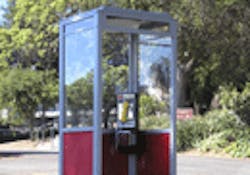According to a government report, the American Trucking Assns.’ (ATA) recently discontinued Highway Watch program was able to reach participant enrollment targets, yet received too few calls to warrant its continuation.
A safety reporting program started in 1998 by ATA, Highway Watch was expanded into security through funding from the U.S. Department of Homeland Security (DHS) in 2003. Highway Watch trained more than 830,000 individuals to identify and report safety and security incidents to a centralized call center, DHS’s Inspector General said.
“Although the American Trucking Assns. reached enrollment targets of more than 800,000 members, security incident reporting has remained steady at less than 200 calls a month,” the report said. “Furthermore, the American Trucking Assns. incurred costs to acquire the assistance of state trucking associations that were not well documented. Therefore, we cannot say definitively whether the benefits achieved so far have been worth the costs. DHS’ inconsistent oversight has also hindered the program.”
(Continued)
The Transportation Security Administration (TSA) awarded ATA a total of $63 million between 2004 and 2007 for the Highway Watch program, saying that it should be focused on four areas--participant identification and recruitment, training, communications, and information analysis and distribution. However, DHS opted to provide the 2008 fiscal year funding to a program run by HMS Company.
According to ATA, the Highway Watch program had many accomplishments. “We ran the program for a number of years, and it was a success,” Clayton Boyce, ATA vp of public affairs and press secretary, told FleetOwner. “It wasn’t the number of calls that were made, but the quality.”
Boyce noted the arrest in 2006 of Mohammed Yusef Mullawala, a commercial driver student seeking a Hazmat endorsement, which resulted from a Highway Watch participant alerting the state authorities of suspected suspicious behavior, as an indication of the program’s achievements.
Highway Watch offered a one-hour awareness training session for surface transportation professionals on ways to identify and report safety hazards and suspicious activity. However, the report said, ATA “met enrollment targets through multi-million dollar reimbursements to state trucking associations, and sole source subcontracts, and did so at the expense of developing cooperative relationships with other highway and motor carrier industry organizations.”
While the ATA program was discontinued, the Inspector General said there was a need for a Federal Trucking Industry Security Grant Program, making recommendations aimed at creating a more efficient system in the future.
According to the report, while more than $30 million was spent on outreach, recruitment and training, DHS and ATA did not encourage industry-wide participation or the development of more or better quality incident reporting.
“Initially, DHS wanted the program to involve all highway and motor carrier industry stakeholders and to provide appropriate sector-specific training,” the report said. “ATA did not implement that plan. Instead, ATA relied primarily on its state trucking associations to recruit, train, and enroll members. Its training program, while high quality, addresses only basic awareness and reporting issues.
“In the formative years of Highway Watch, ATA could have developed more cooperative coalitions or subcontracts with highway and motor carrier industry organizations to establish a broad membership base,” the report continued. “With the exception of school bus associations, ATA did not collaborate with or offer reimbursement to industry organizations to recruit, train, and enroll their members into Highway Watch. Not only did this leave many potential Highway Watch partners antagonistic or indifferent toward the program, it also affected enrollment, as these associations have a combined membership of more than one million.”
The report also said that DHS did not hold ATA to the original terms of the agreement because of inconsistent responsibility for oversight, stating that while it sometimes identified flaws, they lacked the authority to address them.
